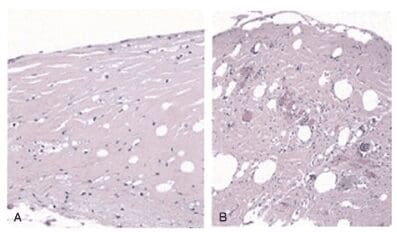
WHAT IS BREAST IMPLANT ILLNESS (BII)?
(The photo above is of a breast implant capsule without (A) and with (B) ruptured silicone contents. Wee C, et al. Understanding Breast Implant Illness, Before and After Explantation: A Patient Reported Outcomes Study. Ann Plast Surg 2020;85:S82-S86.)
Breast Implant Illness (BII) is a label given to a wide range of symptoms that a patient can experience after receiving aesthetic or reconstructive breast implants. It is also sometimes called “ASIA,” for: Autoimmune/Inflammatory Syndrome Induced by Adjuvants. I don’t know about you, but each time I see something given one acronym, let alone many, I try to stop and pay attention. Breast implants are either made of silicone or saline, but even saline implants have a silicone shell. In the vast majority of patients, silicone is a relatively inert substance, meaning that it doesn’t cause any harm after breast augmentation or reconstruction. However, sometimes an array of vague or what are called “constitutional” symptoms occur, which are best explained so far by the inflammatory response theory. This theory suggests that an over-active inflammatory response to the silicone in a breast implant could account for an array of symptoms (below), auto-immune or connective tissue disorders. It is important to remember that there remains controversy as to what really makes up BII, but suffice to say that if you experienced the majority of a confusing group of symptoms after breast augmentation, then it is worth talking to a plastic surgeon about whether this could be caused by your implants.
Some of the symptoms and conditions reported as related to BII are:
- Joint and muscle pain
- Chronic fatigue
- Memory and concentration problems
- Breathing problems
- Sleep disturbance
- Rashes and skin problems
- Dry mouth and dry eyes
- Anxiety
- Depression
- Headaches
- Hair loss
- Gastrointestinal problems
- Alopecia
- Raynaud syndrome
- Lupus
- Rheumatoid arthritis
- Scleroderma
If you suspect that you may be affected by a combination of the above related to your breast implants, don’t hesitate to reach out to seek a free consultation. The keys to treatment of any condition that is caused by an offending agent is usually to remove that agent, and BII is no exception. BII is treated by removal of not only the implant but also the surrounding implant capsule, which is usually the site of interaction between the body and silicone. Keep in mind that this procedure requires surgery in an operating room and you should expect some recovery time. You may also experience deflated breast mounds that you will want to have rejuvenated with a lift procedure, or mastopexy. After removal of the implants, the majority of patients diagnosed correctly with BII experience recovery of their symptoms.
If you would like to learn more about BII, reach out to Kristopher M. Day, MD, FACS by emailing Info@PacificSoundPlasticSurgery.com to schedule a complementary consultation. Dr. Day has specialized training in breast surgery and extensive knowledge about BII. He would be happy talk to you more about this condition or other plastic surgery procedures.

